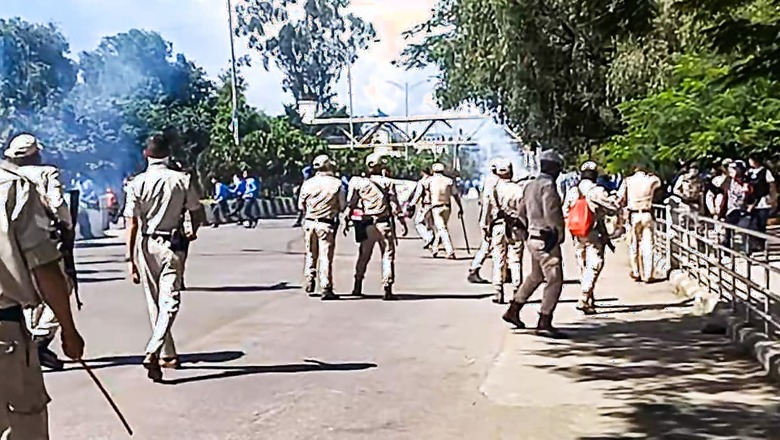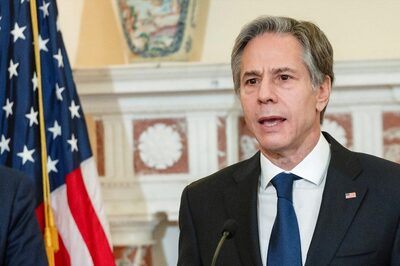
views
Rakesh Balwal was repatriated to his Manipur cadre from Jammu and Kashmir last week as tension intensifies in the north-eastern state. Balwal, who has been on central deputation since 2017, is one of nine non-Manipuri IPS officers who are serving outside their home cadres. A close look at the civil list, last updated in January, says of the 48 IPS officers posted in Manipur, nine are on central deputation for over five to six years or more.
The data by the Ministry of Home Affairs (MHA), accessed by News 18, regarding the decision taken by the Centre to rush senior officers to Manipur owing to the ongoing conflict, suggest the cadre-states of northeast have been “unattractive” to them, and are almost treated as “punishment posting” for non-local officers.
The latest instances of the government trying to manage the situation in Manipur include its decision to appoint a Tripura cadre officer as the DGP of the state. It is in a way bringing the focus back on the glaring methods of washing hands of from the duties for the state and also on the management. For a long time, Manipur and other northeast cadres such as Nagaland and Arunachal (part of AGMUT) have been treated as India’s ‘boondocks’, and the numbers say, nothing much has changed.
Crunch of IPS Officers
According to the Manipur IPS cadre list, last published in January, the state has a sanctioned strength of 91 IPS officers. Of which, 60 are in position across the state, and only 48 of them are IPS officers joining through the direct recruitment process while the rest 12 are promotee-officers (the state service officers who are promoted to IPS after a certain period of services and based on merit). Even though bigger states such as West Bengal, Odisha also face acute crunch of officers, but circumstances seem different for conflict and insurgency-ridden border states like Manipur, Nagaland and Arunachal Pradesh.
In addition to the severe crunch of IPS officers, Manipur has also been witnessing the Kuki-Meitei divide among the officers. The divide initially overwhelmed the system, and the MHA started rushing officers from other states and forces to Manipur. The divide at the senior level also became prominent and fuelled the crisis as the state hardly had any non-local or non-Manipur officer in position.
Kuldiep Singh, advisor to Manipur Chief Minister N Biren Singh, told News18, “The Centre is sending officers from CAPF (Central Armed Police Force) and other forces, agencies and states to Manipur. We are trying to get non-Meitei and non-Kuki officers from different locations. The Centre also has some challenges while officers serving outside also have their own. But the government, as a part of its policy, is trying to rush more officers to Manipur to serve at the functional level”.
Make It ‘Less Unattractive’ If Not Attractive
Prakash Singh, IPS officer, who retired as a DG and is known for his contributions in bringing about the police reforms, said, “The officers who join the service should serve anywhere. But we have been hearing stories about how they get unhappy, if they are posted in the northeast. Some of them indulge in all sorts of jugglery to be out of northeastern cadres states, while some get married to someone with an apparently better cadre allotment and then apply for cadre change on the grounds of marriage. This is a serious issue and the government should now consider this in a practical way. If the government cannot make NE cadres look attractive at least it can work on making it look less unattractive”.
“Earlier, there used to be a service called — Frontier Administrative Service. The government may come up with such options again in which the aspirants will know what they are signing for. They will happily go and join their respective postings. An officer can stay on central deputation maximum for seven years which include two extensions, however, people now manipulate concerned authorities and stay on their desired postings for decades,” he added.
Withdrawal of Incentives
Meanwhile, in September last year, the Central government issued an order withdrawing all special incentives given to AIS officers — IAS and IPS — posted in the seven north-eastern states. The incentives had included a special allowance of 25% on their basic pay, among other.
The Department of Personnel and Training (DoPT), in the order, stated that the policy of retaining government accommodation allocated at the last posting before going to the NE states for group A officers, including AIS officers, had also been withdrawn. Group A officers include those serving in all other central services, including railways, income tax, customs and revenue.
The order also worked as demotivation for many officers who got worried about their families and accommodation.
Responding to the resentment among the officers, the states including Assam, Manipur, Nagaland announced a similar incentive for the officers.

















Comments
0 comment